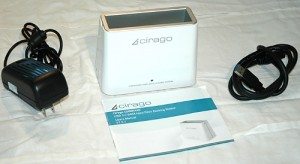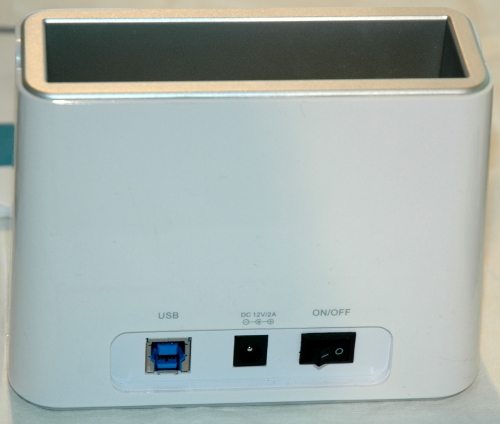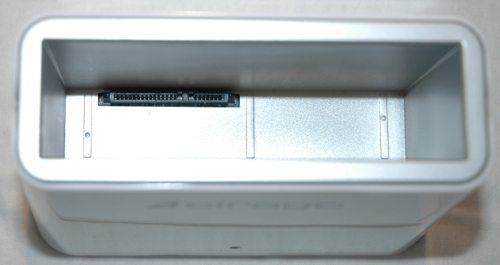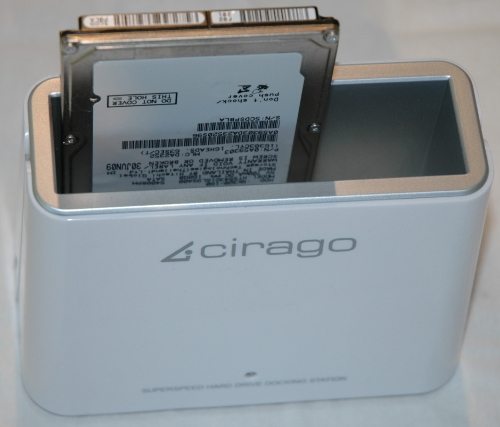 The Cirago USB 3.0 Hard Drive Docking Station is one of those standard external USB docks for the drive freak in all of us. If you’ve got a small pile of SATA drives collecting dust because you’ve upgraded your laptop, or desktop, or both, and you don’t really need yet another USB drive enclosure, this docking station will let you pop a drive in and use it for backup, moving files, whatever, with ease. Support for USB 3.0 means that eventually, you’ll be able to do that a bit faster, too.
The Cirago USB 3.0 Hard Drive Docking Station is one of those standard external USB docks for the drive freak in all of us. If you’ve got a small pile of SATA drives collecting dust because you’ve upgraded your laptop, or desktop, or both, and you don’t really need yet another USB drive enclosure, this docking station will let you pop a drive in and use it for backup, moving files, whatever, with ease. Support for USB 3.0 means that eventually, you’ll be able to do that a bit faster, too.
Setup
The dock is powered by a wall wart, and connects via a standard USB cable. Once you plug it all in, you turn on and off the power via the on/off switch on the back. This is handy, since you’ll want to power off the dock before inserting or removing a drive.
Drive Insertion
Peering into the dock you’ll see the SATA/Power connections in the bottom of the dock, in the upper left corner.
This placement means a full size disk will fill the dock, and a laptop disk will only be supported on one side.
What this means is you’ll probably want to remove laptop drives from the dock when not in use, since any jolt is going to put stress on the connectors in the dock and the drive itself.
Test Drive
The dock does not require any non-standard drivers, and worked with every OS I have handy (Linux, Windows XP/7, MacOS X) as a standard external USB drive. Other than the the ability to swap drives in and out of the dock, it’s just an external USB disk as far as your computer is concerned.
Speed – USB 2.x vs. 3.0
Most people aren’t going to have any USB 3.0 ports. They’ve been available for more than a year, but most manufacturers have been slow to adopt them because there hasn’t been too much demand for them, or even many peripherals that support them. I happen to have both USB 2.1 and 3.0 ports on my Linux box, so I was able to test the raw transfer speed when using both. I happen to have a pair of fairly speedy half gig Seagate drives – one internally connected via SATA, and the other I put into the Cirago docking station. I tested the read speed of the drive when connected to SATA, and when docked connected to USB 2.0 and 3.0:
- Internal SATA: 73MB/sec read
- USB 2.0: 32.5MB/sec
- USB 3.0: 55MB/sec
These are sustained read speeds, not cached reads. The internal test shows the limit of the drive itself, while the two USB tests show that even with USB 3.0, the drive is faster than the USB link. However, it also shows that you’ll get nearly twice the speed out of a USB 3.0 connection, and that’s nothing to sneeze at. The fly in this speed ointment is that you’ll actually need a drive that can keep up with those speeds, and most drives do well to maintain 40MB/sec on write – not much faster than USB 2.0 can deliver. Small 2.5″ laptop drives are generally even slower. Depending on what you cram into the dock, you may see only marginal speed improvements even if you do have a USB 3.0 port on your computer.
Parting Dock
This was one of those products I didn’t know I really needed. While reviewing the Cirago Hard Drive docking station, I found that I actually have a decent pile of raw SATA drives laying around due to upgrades. The ability to toss one into the dock and use it for a backup without hassling with using one of my drive enclosures was amazingly useful.
Seagate Portable 2TB External Hard Drive HDD — USB 3.0 for PC, Mac, PlayStation, & Xbox -1-Year Rescue Service (STGX2000400)
(as of February 25, 2026 14:12 GMT -06:00 - More infoProduct prices and availability are accurate as of the date/time indicated and are subject to change. Any price and availability information displayed on [relevant Amazon Site(s), as applicable] at the time of purchase will apply to the purchase of this product.)Seagate Portable 4TB External Hard Drive HDD – USB 3.0 for PC, Mac, Xbox, & PlayStation - 1-Year Rescue Service (SRD0NF1)
(as of February 25, 2026 14:12 GMT -06:00 - More infoProduct prices and availability are accurate as of the date/time indicated and are subject to change. Any price and availability information displayed on [relevant Amazon Site(s), as applicable] at the time of purchase will apply to the purchase of this product.)Product Information
| Price: | $49.99 |
| Manufacturer: | cirago |
| Requirements: |
|
| Pros: |
|
| Cons: |
|






